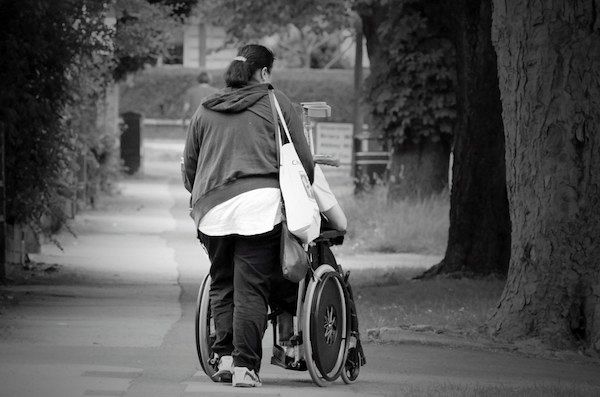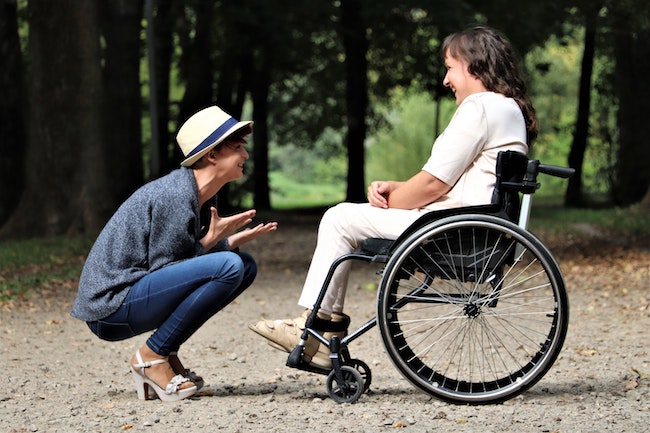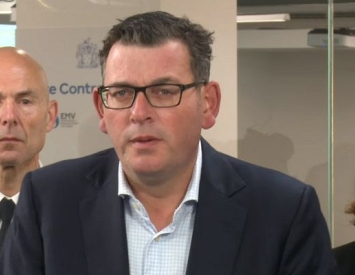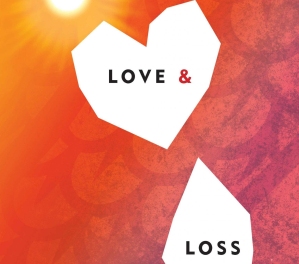Recent deaths suggest gaps in Australia's system of care for vulnerable people with disability, writes Thea Calzoni.
THE National Disability Insurance Scheme (NDIS) is an effective system of care and support for Australians with a disability as long as they can advocate for their needs, but there is no proactive mechanism to check on the wellbeing of the most vulnerable participants in the scheme.
My adult son has a disability and that’s okay.
Like many young people, he’s keen on YouTube. He gets stuck on watching videos. Sometimes this can be a problem because his disability makes it challenging for him to cope with the transition from one activity to another — like getting up from his computer to have dinner or get ready for bed. That’s where he needs help with advance notice, reassurance that he will be able to return to his favourite activity and friendly encouragement to have a meal or take a shower.
It is fortunate that Australia has a unique system of individualised care and support for every citizen with a disability — the NDIS.
Thanks to NDIS support my son is thriving, despite his significant intellectual disability, to the point where he has been able to support others as a camp helper with People Outdoors, a division of the Australian Camps Association.
I was feeling secure about his future when an ABC news story caught me unawares. Anne Marie Smith – a South Australian NDIS participant living alone – died of malnutrition and septic shock as well as issues connected with her cerebral palsy. It was reported that for the past year she had spent her days and nights seated in a cane chair, not using her wheelchair or going out at all.
Her six-hours-per-day support worker has been sacked.
ABC radio Adelaide reported comments from disability advocate Kelly Vincent, acting principal community visitor Anna Gale and former Opposition Leader Bill Shorten, who was Assistant Treasurer when the Gillard Labor Government began setting up the NDIS.
Speaking of the vulnerability felt by recipients needing high levels of care and questioning why Smith only had one carer working with her – unsupervised – Vincent asked:
"Where the hell is the Quality and Safeguard [s] Commissioner?"
Anna Gale said there was an issue of who is responsible for checking up on vulnerable individuals with disabilities and also stated:
“...the Commonwealth Government has a Quality and Safeguards Commission that doesn't do proactive visits, it does reactive visits...The NDIA – the NDIS system – sets up the plan and they should have been putting those things in place."
Bill Shorten said:
“…if the Government's providing services into individuals homes and these are vulnerable people… how come no-one was checking?"
The South Australian Government has set up a task force, chaired by disability advocate David Caudrey, to investigate gaps in the disability care system that allowed Smith’s health and wellbeing to deteriorate so badly.
It took this tragedy to focus my attention on "gaps" for vulnerable individuals without close family members.
One day, that could be my son.
The neglect Smith suffered led to her death. Dana McAuley reported for The Sydney Morning Herald another death: that of David Harris, a man with mental illness and diabetes whose supports ceased when he lost NDIS funding after missing his annual review meeting. Shortly after that, he died alone of causes that could not be determined.
As well as physically disabled people, there are risks for people with a cognitive or neurological disability. When a person lives alone with the support of a government-funded benefit such as a Disability Support Pension — who is responsible for the oversight of his or her welfare?
Currently, there is no onus on Services Australia to check on the wellbeing of benefit recipients. Rather than assessing pensioner wellbeing, service reviews may result in a withdrawal of service. Similar to the situation of the NDIS cessation of service to David Harris, a person without timely family advocacy can be placed in a potentially life-threatening situation.
What regard is there for vulnerable people? There could be support worker advocacy with support workers speaking up for the individuals they are contracted to assist. There is no evidence of such a culture in the neglectful care of Smith. Nor in the case of Harris, whose support workers disappeared from his life without advocating for his ongoing needs when his service was cut off.
Support workers have the most intimate knowledge of a person’s needs, but they have no contractual responsibility for his or her welfare beyond their shift. Harris may not appear to have suffered direct abuse or neglect, as he died alone, in the absence of care. His plight was more of general disregard — the social cost of individualism.
The State will provide information and support but it is up to the individual to access it. Advocacy to protect and defend the welfare of people with disability is poorly funded with responsibility vested in the states.
An advocate could have helped Harris with preparing for his NDIS plan review and he might have met his appointment and not had his services cut off. But without any friend to connect him to an advocate, David Harris would have likely faced similar difficulty contacting an advocate as attending his NDIS review meeting.
I expect that the ongoing Disability Royal Commission will have findings that show the need for government to proactively monitor the welfare of vulnerable people with disability. I hope that Labor will develop policies that support the community over the individual and make good Bill Shorten’s call for the Federal Government to check in on the wellbeing of people receiving disability support in their homes.
While I am alive, I will advocate for a system that will check in on my son when I am dead and gone.
I want a government that will make agencies acutely responsible for the real-life welfare of the people they are supposed to serve.
Thea Calzoni is a member of the committee of management of the Victorian Advocacy League for Individuals with a Disability (VALID). You can follow Thea on Twitter @Calzonit.
 This work is licensed under a Creative Commons Attribution-NonCommercial-NoDerivs 3.0 Australia License
This work is licensed under a Creative Commons Attribution-NonCommercial-NoDerivs 3.0 Australia License
Support independent journalism Subscribe to IA.












